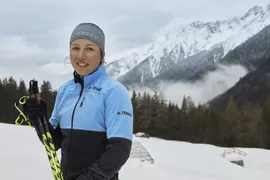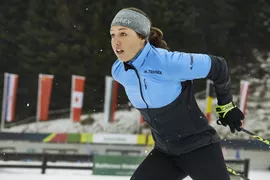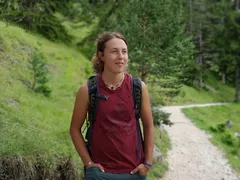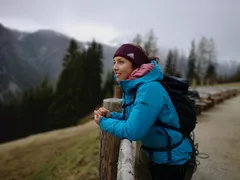Germany's most successful biathlete Laura Dahlmeier ended her active career last year at the age of just 25. At the 2018 Olympic Games in Pyeongchang/South Korea she won two gold and one bronze medal, in addition to seven gold, three silver and five bronze medals at biathlon world championships, 20 world cup victories and the triumph in the overall world cup in the 2016/17 season. Since October 2019, the native of Garmisch-Partenkirchen has been studying sports science at the Technical University of Munich.
Ms. Dahlmeier, you are now in your second semester of your Sports Science studies at the Technical University of Munich. How are you enjoying your studies so far?
"The studies are really exciting, versatile and varied. As always, I am glad that I started it. I would have never thought that sports science covers so many areas. In the first semester in particular, the focus was naturally on sport in the broadest sense, but the content was extremely wide-ranging. There were plenty of modules and subjects that I didn't even have on my radar."
Why did you decide to study sports science?
"I really enjoy sports! I like to be outdoors; I like to move around, and I also enjoy sports and training. So, in this respect, it was quite natural to study sports science. Another reason was that studying at the TUM is relatively theoretical and highly diversified. It was important to me not only to learn the practical aspects of all sports, but above all, to understand the background information behind them. Because, naturally, I'm interested in what's behind sports science."
Is there an area in which you are particularly interested that you would like to work in later professionally?
"Certainly, the subject of training is an area that interests me very much. But I do not want to commit myself to the question of whether I would like to work in the training area later in my career at the moment. Above all, it was important for me to approach my studies neutrally without bias and to keep my eyes and ears open. I want to explore all the subjects in peace and quiet rather than concentrating on just one area from the outset."
In these times marked by the coronavirus, the current state of your studies is also somewhat different than usual - how are you dealing with the current situation?
"In principle, I am an extremely optimistic person. This is a great advantage for me, especially in this situation. From the very beginning I was not afraid of getting sick. However, of course, it is frightening what is happening to our world right now. The restrictions for the entire population are already immense and the situation is also a huge challenge for the economy. You have to try to organise and structure your everyday life in the best possible way and remain flexible. But, naturally, it requires a bit of rethinking."
How are you coping with digital teaching in the summer semester so far?
"I am incredibly happy that I am already in my second semester now. Completing the first semester online is not necessarily how one imagines studying. Currently, digital teaching is working quite well, and there are some lecturers who are really good at it. Of course, it would be nice if certain topics could also be taught in the classroom. However, I also understand that the larger lectures with 250 to 500 people cannot be held in the lecture hall. Nevertheless, at least for the small modules, where we are divided into groups, it would be desirable to have two or three teaching units on site by the end of the semester."
After plenty of deliberation, the Summer Olympics in Tokyo have been postponed to 2021 due to the global COVID-19 pandemic. Was this the right decision?
"Given the current situation and how the situation with coronavirus has developed, I understand the decision and think it was the right one. Seen from a sporting point of view, it is drastic, of course. Olympic Games take a long time to prepare for, and they only take place every four years. Many athletes plan their career in such a way that they intend to achieve this high point and then retire. The IOC also hesitated with its decision somewhat. In this case it is certainly difficult if you are an athlete hanging in the air and don't know whether you should still get the maximum out of your training in the next four weeks."
It is now almost exactly one year since you announced the end of your career - what has changed for you this year?
"I always wanted to become a biathlete and competitive athlete, that was my ultimate goal. That is why I completely focused my life around sports. However, I also knew that I could not practice sports forever. Therefore, this decision was not so sudden for me. Nevertheless, everything changes when the whole structure of competitive sports breaks down. I really enjoyed this freedom in the summer, though. I was on the road an awful lot, whether cycling or climbing. On the other hand, I also realised that living without any structure is not the best way to live either. With this new overabundance of possibilities, it isn't so easy to organise your everyday life and find your rhythm."
You are currently training to become a biathlon coach - would becoming a national biathlon coach be a suitable career step for you?
"Right, currently I am working on my B-Trainer certificate, but unfortunately we had to take a break in this respect due to Corona. We have already completed one part, but there is still another part pending, which would have been planned for the springtime. At the moment I am working on my term paper and have chosen a technical project for it. I find the coaching programme exciting, but I doubt whether I will become the new national coach right away. I don't think so, at least not anytime in the near future."
After your biathlon career you have now found a second sporting passion to pursue - trailrunning. How did that happen?
"If you are born in Garmisch-Partenkirchen and you want to go running, then you inevitably have to run up and down a mountain, because there are not so many flat routes. I am often asked when I began trailrunning, yet, ultimately, I have been running in the mountains since I could walk. Already during my active biathlon career, I participated in the 'Zugspitz Ultratrail' twice, last year I participated for a third time. At that time, I was quite fit and was able to directly win the 38.7k event. My victory was also the qualification for the World Mountain Running Championships in Argentina in autumn. I was not expecting this at all. The time in Argentina was a very exciting experience for me, but I also know that I am currently no longer ready to participate in competitive sports at this level.
Since last December you have been strengthening the ZDF team as a biathlon expert - how were your first TV appearances?
"I really enjoy working as a ZDF expert. It is amazing how many people are part of a TV crew. As an athlete, you don't notice it at all, you only see the cameras standing in the forest or the reporter interviewing you after you cross the finish line. So, it was very exciting to be able to switch sides and see things from another perspective."
How were you received by the ZDF editorial staff?
"For the most part, I have been accepted quite normally as a colleague. A few, who do not necessarily deal with athletes on a daily basis, perceived me more as a former professional athlete and Olympic champion in the beginning, which is why they felt they had to treat me with some kind of additional respect. Fortunately, this quickly subsided when they realized that I am also just a human being."
What are the greatest challenges for you in your broadcasting work?
"Time management during a broadcast is challenging. The time to share your information is limited. In this short period of time, it is not so easy to always find the right wording or to speak too hastily. You always keep an eye on the clock. This results in pressure. However, at the end of the day, it is important not to tense up, even if the show is live and you only have a few seconds."
Thank you very much for the interview and all the best for your studies at TUM!
To the homepage of Laura Dahlmeier
Contact:
Romy Schwaiger
Department of Sports and Health Sciences
Uptown München, Campus D
Georg-Brauchle Ring 60/62
80992 München
phone: 089 289 24638
e-mail: Romy.Schwaiger(at)tum.de
Interview: Romy Schwaiger
Photos: tri:ceps GmbH/Laura Dahlmeier



